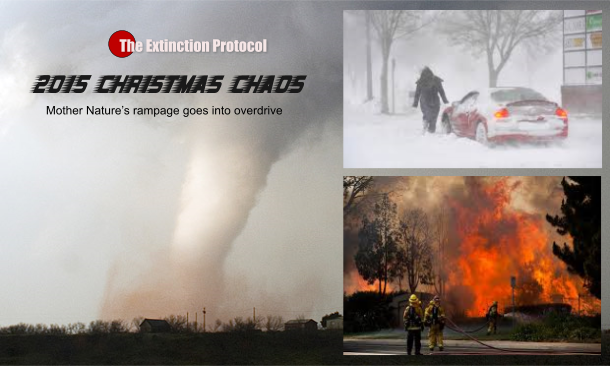Wednesday
As 2015 winds down, I am reposting essays (today’s is slightly amended) that I wrote this past year about how literature can help address the most urgent challenges we face. In June, as Texas was experiencing violent flooding and California continued to endure its cataclysmic drought and equally cataclysmic wild fires, I applied John Donne’s “Valediction: Forbidding Mourning” to climate change denial.
Since then, weather conditions have only gotten worse, and (as many have noted) the weather outside is indeed frightful. 2015 was the warmest year on record and we’re seeing the results as tornadoes ravage huge swathes of America, record rainfalls pound the United Kingdom and much of South America, and killer droughts ravage Australia, Ethiopia, and Indonesia.
Fortunately, the world has finally begun to take preliminary steps to address what is occurring. Or at least all the world except for America’s conservative party, which continues to hide its head in the sand. Some of its presidential candidates are even promising to withdraw from the international climate change accord if they are elected.
If you want a summary of how climate change + El Nino is behind the extreme weather that has been hammering virtually every part of the globe this past year, this Slate article is must reading. The future has arrived and it will only get worse if we don’t take drastic action.
Donne and Climate Change Denial, reprinted from June 2, 2015
As I watch the extreme weather occurring in Texas and California, I am reminded of a blackly humorous Kingston Trio song from my childhood:
They’re rioting in Africa,
They’re starving in Spain,
There are hurricanes in Florida,
And Texas needs rain.
The song cheerfully adds that humans are on the verge of nuclear armageddon:
And we know for certain
That some lovely day
Someone will set the spark off
And we will all be blown away.
Who could have predicted then that (1) we were creating hurricanes and droughts just as we had created the atom bomb (albeit not deliberately), and (2) by the early 21st century more humans would have been killed by human-caused climate change than by nuclear weapons. Climate scientists are pretty sure that Texas’ rainstorms are attributable to the warming Gulf of Mexico waters, which are putting far more moisture into the air than normal. At least Texas no longer needs rain.
Of course, try telling this to the political right and to those fossil fuel barons like the Koch brothers, who would rather attack climate scientists than save the planet. When I think of climate denial, I am put in mind of John Donne’s“Valediction Forbidding Mourning.” Given that Donne’s tender poem is about his spiritual connection with his wife when he is traveling, I know this sounds far-fetched so allow me to explain.
As the poem begins, Donne talks about two kinds of people. There are those who focus on immediate cataclysm and there are those who take a longer or more elevated view. Most of us, when we are dying or when we face a long separation, engage in “tear-floods” and “sigh-tempests.” We emotionally react when we encounter a “moving of th’ earth,” whether figurative or literal.
In terms of climate change, we as a country react to such extreme climate events like the Texas floods and Hurricane Sandy. We don’t react, however, to global warming, which in the poem is comparable to Donne’s “trepidation of the spheres” or movement of the stars. The 17th century saw such movement as having a profound effect on worldly events but it seemed “innocent” because we don’t see the effects. Here are Donne’s opening stanzas:
As virtuous men pass mildly away,
And whisper to their souls to go,
Whilst some of their sad friends do say
The breath goes now, and some say, No:
So let us melt, and make no noise,
No tear-floods, nor sigh-tempests move;
‘Twere profanation of our joys
To tell the laity our love.
Moving of th’ earth brings harms and fears,
Men reckon what it did, and meant;
But trepidation of the spheres,
Though greater far, is innocent.
“Virtuous men,” in other words, see the deep workings of the universe and make connections. One image of connection in the poem is a fine golden thread joining the separated couple, metaphor of their spiritual union. Most eyes can’t see this thread.
Where the poem is not applicable is in Donne’s admonition to be calm. This might be good advice if there were indeed nothing we could do. As it turns out, however, we can influence the “trepidation of the spheres.” Or at least we can slow down climate change by reducing our carbon emissions.
A second poem tells us what we should be striving for. In “The Good Morrow” Donne describes a balanced earth. Asserting that “whatever dies was not mixed equally,” he imagines two lovers as a planet “without sharp north, without declining west.” Invoking the alchemists’ search for perfection, he says that a balanced relationship will endure.
Balance will also ensure that humans can continue to live on this earth. We either strive for that balance or we perish.


